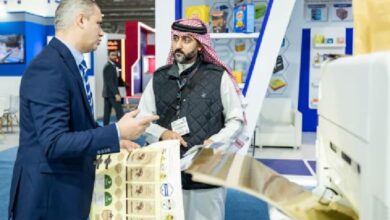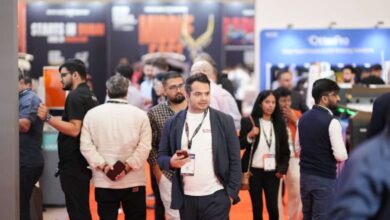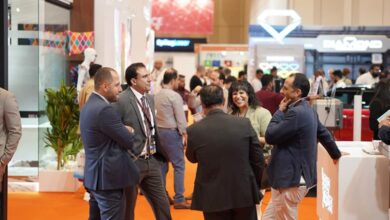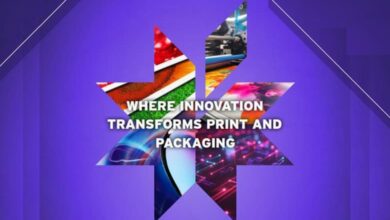OF Gloom And Glory
United Printing and Publishing (UPP) in Abu Dhabi is one of the largest printing operations in the Middle East and one of the biggest newspaper printers in UAE.
The company which boasts a wide range of printing equipment from prepress to postpress is planning big for future and not surprisingly is investing in more profitable sectors of graphic arts such as security and package printing.
The mastermind behind UPP is Ali Saif Al Nuaimi who is an avid reader and writer. As the CEO he is responsible for overseeing company’s day to day activities and plans for future development. We recently visited UPP’s facility in Al Shahamah and sat down with Nuaimi to find out more about company’s new investment plan and strategy for a future that seems more and more challenging for the printing industry.
We recently visited UPP’s facility in Al Shahamah and sat down with Nuaimi to find out more about company’s new investment plan and strategy for a future that seems more and more challenging for the printing industry.
It might sound cliché but my first question from Ali Al Nuaimi was how he got into the world of ink and paper. “I consider myself a bookworm. I have read more than 2000 books. I have a passion for politics and history. My recent article has been published in Al Masri Al Youm. It’ is the first time that an article which is political in nature and written by an Emirati is published in a major Egyptian newspaper. I love reading and I particularly like to read Mohamed Hassanein Heikal. He forces you to think and read even more. So I think my love of printed word has been a strong motivator to build the foundation of UPP,” enthuses Nuaimi.
UPP formerly known as Emirates Media Incorporation (which was established in early 70’s as part of the Abu Dhabi Media Company) is an ISO certified company with an ambitious agenda. Although the company is a major newspaper and commercial printer, during last two years UPP invested more than 120 Million AED largely in security printing equipment and solutions. Their premises in Al Shahamah, built in 2006, is very convenient as far as the distribution of newspaper is concerned. It’s strategically located between Dubai and Abu Dhabi. With the company’s new focus on security printing part of the building will turn into a fortress equipped with state-of-the-art surveillance and monitoring devices.
The new extension to the building where security printing operation will take place is already finished and the equipment are installed and commissioned. “At the moment we are running some test prints. Within one month the new facility will start delivering the first orders. We will be producing all kinds of smart cards, SIM cards, loyalty cards and you name it. We are also diversifying into packaging in a small scale. We will produce folding carton and small packages for security cards that we produce.
On the other hand we will develop our packaging operations in future as we learn more about the markets. The equipment that we are using for our security printing operation is top of the line and made by German manufacturer Mühlbauer. We have also Manroland and KBA sheetfed presses, which will be used for production of packaging. It is a very promising market,” explains Nuaimi.
He adds,” opening up a security printing division within UPP had its fair share of challenges. Security printing operation should be an isolated and separate section within the premises. We even installed motion sensors system in the building to track all the movements. We will be delivering our first batch of printed cards by the end of November.”
More gloom than glory in the future for newspapers
UPP has an impressive lineup of webfed and sheetfed presses including a range of Komori, KBA, Heidelberg and Manroland sheetfed as well as Rotoman 65, KBA Compacta 215 commercial web and KBA Continent, Orient Super and Manugraph Hiline newspaper web offset presses. For finishing and post press operation an arsenal of top of the line diecutting, thermal and cold lamination, perfect binding and inserting equipment and hard case cover line for book productions from major manufacturers such as Kama, Heidelberg, Horizon, Kolbus, MBO and Muller Martini make UPP a one stop shop for a wide range of printing enquiries. The company also boasts a Kodak NexPress 3500SW and an HP Scitex LX800 Digital wide format printer.
However for time being Nuaimi is not considering additional investment in digital printing. “In UPP every department is independent and based on their feedback we plan our investment strategy. We made a solid investment in digital printing during past few years but now our focus is security and package printing. The decision to enter into security printing was not taken lightly. Before we decided to embark on this project we commissioned Smithers Pira to conduct an in depth research on prevailing trends in graphic arts industry and offer us a personalized interpretation on investment opportunities. Based on their study we came to conclusion that Security and package printing are the most promising sectors of graphic arts industry in the future. ”
Although UPP has always been a major newspaper printer Nuaimi sees a greater chance for gloom than for glory in coming years for newspapers. “We are printing 6 newspapers. In total 1 million copies of newspapers per night plus 2.5 million magazines and books per month and a myriad of other commercial jobs are produced in UPP. However I must admit newspaper is a dying industry. When a manufacturer such as KBA whose name is synonymous with newspaper industry comes up with a digital webfed machine you can pretty much suspect where the industry is going. Now a day people don’t even bother to surf the web for news. They get their dose of news from social media web sites such as Facebook or Twitter. Having said that newspapers will survive but they will be distributed free. No one will pay for it.”
In our region, Nuaimi believes, many newspapers are still in business mainly due to government support. “If within 5 years we are still printing newspapers then we are lucky. In countries such as UAE where the communication and IT structure is quite advanced and the government is also adhering to the idea of e-government I don’t know how newspapers can survive.”
 Nuaimi also believes some of the strategies and new trends that have produced positive effects in newspaper industry in the western world does not apply here. “Changing the formats to Berliner or tabloid basically makes the newspaper easier to carry. People in Europe are used to the idea of reading newspapers while they commute. This is not the case in our region so the convenience of smaller size loses its appeal. Although here also newspapers are resorting to the same strategy but it’s merely a change in style not substance. On the other hand making the newspaper smaller in size should lead to a saving in paper, but while the size is reduced there are more pages going into each edition. So they don’t actually save on price of the paper either. ”
Nuaimi also believes some of the strategies and new trends that have produced positive effects in newspaper industry in the western world does not apply here. “Changing the formats to Berliner or tabloid basically makes the newspaper easier to carry. People in Europe are used to the idea of reading newspapers while they commute. This is not the case in our region so the convenience of smaller size loses its appeal. Although here also newspapers are resorting to the same strategy but it’s merely a change in style not substance. On the other hand making the newspaper smaller in size should lead to a saving in paper, but while the size is reduced there are more pages going into each edition. So they don’t actually save on price of the paper either. ”
Being affiliated to the government of Abu Dhabi must give UPP a huge leverage and financial clout. But Nuaimi says UPP as well as government of Abu Dhabi are following the open market rules.” We have support from Abu Dhabi government but it’s in the form of guaranteeing bank loan and also some printing orders such as Al Ittihad newspapers. But the majority of our customers are from private sector. Our mission is to be profitable. We receive many orders from African countries. Last year we printed 12 million books for Africa. We are agent of 5 major recycled paper manufacturers as well. All our investment is very well thought out and it’s based on trends and demands in the market. I don’t believe in winning printing contracts by government order. Abu Dhabi government subscribes to the rules of open market. Each month I’m losing more than 13.5 million AED of government printing contracts that is going to other printing houses. I believe if you are competent and offer good service you’ll get the job.
Creating opportunities for younger generation
UPP is contributing to the development of print education in UAE by cooperating with Higher College of Technology. The college is offering courses in print communication and for practical training the students can use UPP facility. Being involved in real printing production environment the students have the opportunity to gain hands on experience. Nuaimi is also a firm believer in providing job opportunities to Emiratis.
”We hired 25 locals including 18 females this year. During past two years also we employed many locals who are now working in different departments. But what I am most proud of is the opportunity that I provided to 10 inmates who were serving time in prison for minor offences. These people are now an integral part of UPP’s 580 strong workforce. They found new life and a promising future here.”
And the future?
Nuaimi believes the future of printing industry is yet to be written. “There are lot of talks and possible scenarios about the future of printing. I think it is very hard to speculate what will happen. Many contend the role of printing will be diminished in the future but I believe the future of print will be cyclical. Print and paper will rise and fall, ignored and rediscovered. To tell you an example I remember few years back price of paper jumped drastically. The reason for this sudden hike was the earthquake in Chile which forced pulp manufacturers to shut down their factories. The market pulp capacity in Chile account for 8% of the world total. I had a stock of paper that I wanted to sale and in less than 24 hours prices of paper sky rocketed. I was flooded with enquiries. There are many factors that can affect the development of technology and market trends. Digital is future but how it will affect us all and in which way it will change our lives remains to be seen.”
Nuaimi has high hopes for the future of printing industry in UAE.” I believe for UAE the future is bright. If Dubai wins the World Expo bid 2020 Dubai government is planning to invest more than 250 billion Dirhams in infrastructure projects in next 6 years. It is expected that more than 20 million visitors travel to UAE on the occasion of Expo. This is indeed very good news for printing industry in UAE,” concludes Nuaimi.




